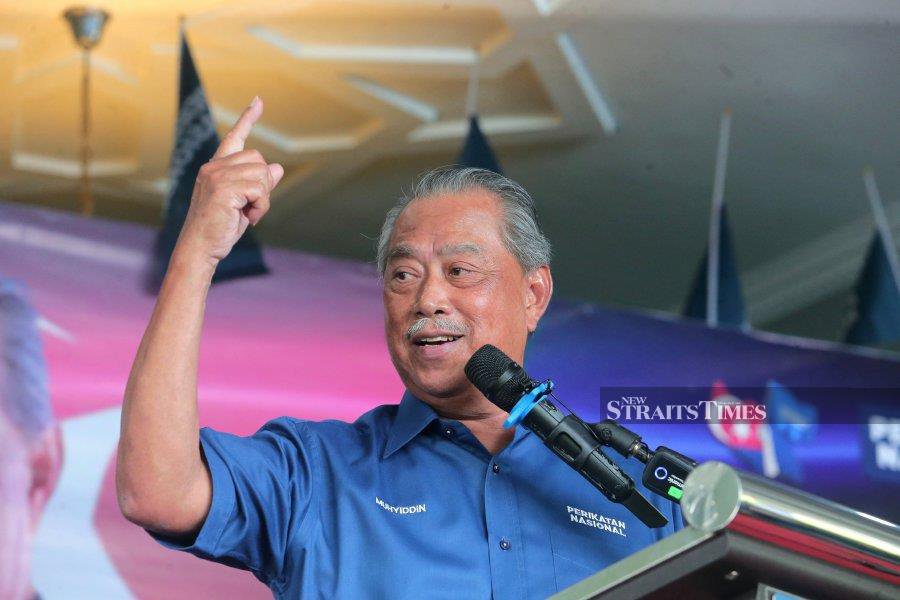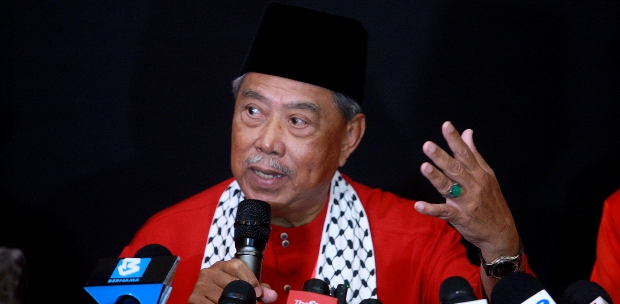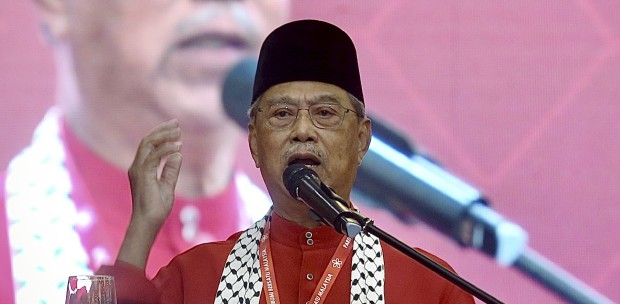IN Malaysia, the last vestige of defence for Tan Sri Muhyiddin Yassin, who might have lost the plot or whose position seems compromised and weakened, is to suddenly double down on a decades-old, cynical Pas ploy — branding fellow Muslim rivals as infidels or their actions as "haram".
This risqué form of religious guilt shaming against Malay-Muslim political leaders has been so perfected by Pas that legions of supporters across the four states it controls believe that the party is the creditable syariah jurisdiction that can guarantee safe passage to heaven, provided you support and vote for them and their outlandish edicts.
This is the plausible explanation as to why Muhyiddin, the Parti Pribumi Bersatu Malaysia (Bersatu) president and Perikatan Nasional chairman, unexpectedly blurted out what it really is: a political dog whistle when he declared it "haram" (forbidden or unlawful) to vote for Pakatan Harapan (PH) candidate Suhaizan Kaiat in the Pulai parliamentary by-election.
Police are investigating after a report was lodged against Muhyiddin for uttering the so-called "fatwa", or at the very least, what an outraged PH is deeming it.
But let's be judicious: it's a big stretch defining what Muhyiddin uttered as an authentic "fatwa": first, it originated not from a special decree by the National Fatwa Council, which is the only recognised authority to issue a fatwa.
Second, Muhyiddin allegedly made the desperate play at a political ceramah in Johor Baru, where the backdrop was high-temperature emotions.
In the same campaign speech, Muhyiddin, after "decreeing as haram" a vote for PH, acknowledged that his "fatwa" will be challenged for its authenticity.
Still, Muhyiddin justified his decree by insisting that nine months after the November 2022 general election, the situation has aggravated, especially with high consumer prices.
So, Muhyiddin was leaning more towards a "political" "fatwa", not a "religious" one, but it is still steep in religious connotation and implication.
Muhyiddin likely knows this circumstance, so at best he is campaigning and persuading Muslim voters not to vote for PH, and at worst, he is merely aping Pas' abhorrent base instincts.
Even PH leaders understand Muhyiddin's "copycat" behaviour, but are still worried that the PN leader has entered the "takfiri" phase.
"Takfiri" happens when a Muslim accuses a fellow Muslim of being an apostate or if they are "insufficiently religious".
The super-sensitive issues of tribalism and uncompromising religious dogma are the razor-sharp end of Malaydom's political spear: whoever wields and hurls it foremost may seek to gain an upper-hand, immaterial whether it is morally correct or repugnant.
Somehow, stirring emotive elements of racial and religious vulnerability, especially on these two hard-boiled issues, gets the base's adrenaline pumping and screaming for blood.
Tribalism and religious dogma have been so ultra-powerful that Pas' ruthless deployment received measurable successes in wresting Kelantan, Terengganu, Kedah and Perlis from Umno, and reinforcing a fortress shielding the four states from "clear thinking and common sense".
In Pas, the country has come to expect their unforgiving weaponisation of religious dogma, starting in the 1960s and burgeoning in the 1980s before its current molten state.
But lately, after an insurgence of fortuitous power grabs in the several election cycles, Pas has latched on to the idea of Malay tribalism as another offensive texture in their arsenal of political weapons.
Pas didn't even bother to put a veil on their intentions; they embraced their most loathed long-time foe, former prime minister Tun Dr Mahathir Mohamad, who has unconscionably spearheaded the notion that Malays and Muslims are being taken advantage of, denied their constitutional rights, and losing authority and power to other Malaysians.
Never mind if Dr Mahathir had 22 years to repair this so-called lopsidedness and another shot when he reprised the premiership in 2018.
Never mind if Malays wholly dominate the civil service, judiciary, police, military and security services except for the financial economy, which they lagged behind, no doubt from their own missteps.
And also, never mind if state religious authorities have a tight hold on the Muslim way of life; there is no loophole, liberal or anarchic, to act otherwise.
Nevertheless, the Malay-Islamic card has always been a political warhorse, a biting political strategy to capitalise by Malay political leaders, who feel they are boxed into a corner.
Ergo, Muhyiddin. It seems that he has been hanging out with Pas president Tan Sri Abdul Hadi Awang for the longest time now and has adopted some of the latter's whimsical habits, like branding Umno as infidels as far back as 1981 and averring to supporters that supporting Pas' own dog whistles are guaranteed access to the good afterlife.
The branding or accusation of another Muslim as committing "haram" acts has been established by major Islamic scholars as post-Quranic, but politics compels its players to be "inventive", especially in the game of one-upmanship.
It's not hard to understand why Muhyiddin is borrowing this favourite Pas gambit to denounce political rivals and influence the outcome of a tight by-election.
It would seem that in sleeping cozily with what was once his sworn enemy when he was riding high in Umno and the government, Muhyiddin may have suddenly realised that his position as chief oppositionist is being subverted, especially after he was left out of the top-notch delegation of Pas menteris besar of Kelantan, Terengganu, Kedah and Perlis in a private meeting with Dr Mahathir last week, led by Hadi.
So he gambled by playing the "fatwa" card, which used to be Pas' exclusive domain. Pas may be baffled at Muhyiddin's application of their clichéd strategy; there is no word yet on how Pas feels about someone else plagiarising their playbook.






